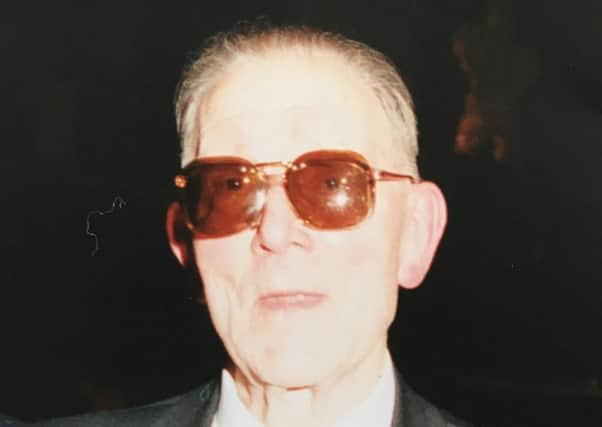Obituary: Paul Miller, soldier, councillor and community activist


With his customary trenchcoat and signature black glasses, Paul Miller cut a familiar and distinctive figure across Aberdeenshire but few knew that his trademark shades and unusual accent hid a fascinating legacy spanning two of the 20th century’s most tumultuous events.
Though best known for his enthusiasm for his Keep Grampian Beautiful campaign and prodigious community work in the North-east, it transpired his roots were many thousands of miles away in Russia and Lithuania.
Advertisement
Hide AdAdvertisement
Hide AdHis parents, Russian cabinet maker Victor Paulonis and his Lithuanian wife Cecilia, had fled persecution before the Russian Revolution of 1917. Their youngest son, the last of their nine children, was born that year in England and named not Paul Miller but George Paulonis. Later he would serve Britain during the Second World War, sustaining terrible injuries in a landmine explosion that left him with shrapnel embedded in his skull and a lifetime of migraines, resulting in the perennial wearing of dark glasses.
His suffering of the debilitating condition led to him set up the Migraine Trust in Scotland, in the hope of finding a cure. But that was just one of a plethora of initiatives he embraced: a former army major, he was a farmer, environmentalist, councillor, champion of the disadvantaged, catalyst of a self-build housing association and potential Benedictine monk. His life was so rich and varied that many suggested he should write a book but he was simply far too busy to devote time to that.
As a boy of 13 his life was profoundly affected by the loss of his mother and a few years later he faked his age at 17 to follow his brother William into the armed forces in 1934. He joined the 12th Corps of Royal Engineers and was posted to Palestine, then a British Mandate.
During the Second World War he saw action in the Western Desert and was permanently scarred when he was blown up by a landmine.He later served in the Far East and Italy.
In peacetime he continued his army service, in Holland and Germany where he met his future wife Monica, an ATS officer, and they married in 1949.
A posting in Berlin followed, before heading for the Far East again, first to Singapore and then to Kluang in Malaya as deputy commander of the Royal Engineers. After a brief stint back in the UK he was posted to Dusseldorf. From there he went to Tripoli and Cyprus before retiring from as a major in 1961 and returning to the UK. By this time he had a son and daughter and the family decided to settle in the Scottish coastal community of Balmedie. After a month’s training, with Maitland Mackie the patriarch of a well-known farming family, he set himself up in a small-holding at Menie Park, now part of Donald Trump’s golfing estate.
That year he also joined St Peter’s Catholic Church and became increasingly involved with the parish over the next 55 years. His community work began after he was asked to attend the local Belhelvie Community Association AGM and emerged from the gathering as its secretary and treasurer, serving as chairman for 26 years. Urged on by his children he organised a weekly youth club and also began sand yachting along the expansive beach.
The lack of trees along the coast prompted him to start a mass planting campaign in 1965 and he rallied volunteers to plant hundreds of thousands of saplings. Almost 25 years later there were said to be 13 million trees.
Advertisement
Hide AdAdvertisement
Hide AdThe erosion of local sand dunes by gales also galvanised him into action and he organised volunteers to transplant marram grass to try to stabilise the dunes, work that continued for over 40 years.
His local government career started in 1967 when a retiring councillor nominated him as his successor in the County Council’s Belhelvie ward. Miller’s environmental interests soon saw him become publicity officer and later chairman of the Keep Aberdeenshire Tidy campaign. After local government re-organisation he initiated the Keep Grampian Beautiful (KGB) campaign and the annual Best Kept School contest. During a visit to Balmoral Castle, where he had been invited to advise on pine trees, a comment by Prince Philip about derelict farm buildings prompted Miller to launch the Best Kept Farmstead competition. He also roped in local prisoners to clean up Balmedie beach.
In the 1970s he considered the monastic life and became an Oblate after a ten-day retreat at Pluscarden Priory but he was advised that path was not for him.
When the North Sea boom sent house prices soaring he tackled the lack of affordable homes by forming the Caledonian Self-Build Housing Association, raising £17 million to obtain sites and planning permission, aiming to build 350 homes.
He set up Delta – the Disabled, Elderly, Lonely and Those Associated – which he ran for 25 years, organising get-togethers for hundreds each week plus pilgrimages to places including Lourdes, Medjugorje and the Holy Land. He chaired the Grampian committee for International Year of Disabled People, worked to introduce a community alarm scheme, began a branch of the Order of Christian Unity, was received into the Order of St John and awarded the Benementi Medal by Pope John Paul II. He served three local authorities, latterly as deputy chairman of Grampian Region’s social work committee.
At 85, he finally scaled down his commitments but continued with the Migraine Action Association until 2005 and remained chair of the Belhelvie Senior Citizen committee, which he began more than 50 years ago, until his death.
Latterly his great joy was the next generation, his two great grandsons whom he regularly looked after, often tending trees together.
He is survived by them, his granddaughter Nicola and daughter Maggie.